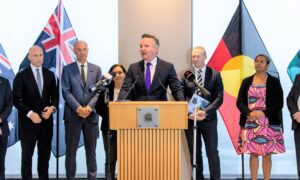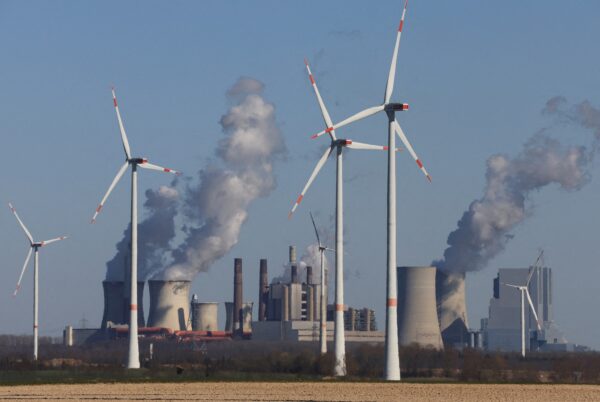Recklessly Charging Towards Renewable Energy Could Be Detrimental
CommentaryAustralia Energy Minister Chris Bowen left the country on the weekend to attend COP27 at the luxurious location of Sharm-el-Sheik on the Red Sea, Egypt. Leaving aside the huge carbon emissions just for getting himself there, one would have thought that presiding over the steepest rise in energy prices since records began should be headache enough for Prime Minister Anthony Albanese to ensure Bowen stays home to deal with the crisis. Remember, Albanese was elected on a promise to cut power bills by $275 (US$176) a year. Even Greta Thunberg is giving COP27 a wide berth this year. As Nick Cater wrote in The Australian, Labor should be looking for plan B. However, the government’s insistence on sticking to a path determined before the exposure of the renewable energy sham in Europe is reckless in the extreme. Cater tellingly notes that the “Putin-ate-my-homework” excuse won’t work for long; neither will Bowen’s promise to bring prices down by installing 22,000 solar panels a day and 40 wind turbines a month for the next eight years. Cater adds: “Presumably he hasn’t factored in the $20 billion the government is about to spend upgrading the grid to facilitate the development of mega wind and solar generators. Nor has he taken note of the soaring price of steel, copper, lithium and other minerals necessary to produce and connect solar, wind and batteries.” This wouldn’t be the first time. For example, let’s go back to 2008. Then Prime Minister Kevin Rudd had the best poll numbers of all time. His assistant treasurer was Chris Bowen, and his brilliant scheme for keeping a lid on cost of living pressures was “Grocery Watch.” It was an unmitigated disaster at all levels and was shelved within months. For many, that was the beginning of the end of Rudd. Everyday Australians Suffer From Rising Energy Costs Now Bowen, as energy minister, is either misguided or displaying ignorance on policy regarding nuclear energy and electric cars that will have devastating effects on Australians. With regard to nuclear energy, Bowen insists that it would push up power prices and crowd out cheaper and cleaner technologies, adding that people who seek to argue for it “perpetuate the climate wars.” There’s nothing like emotive language to make an argument when the facts are not on your side. Just ask anyone in the United Kingdom and Europe how renewable energy has worked out for them. Power prices have increased at least five times over the last year. Energy rations loom across the continent just in time for winter. Wind power stations of German utility RWE, one of Europe’s biggest electricity companies, in front of RWE’s brown coal fired power plants of Neurath near Jackerath, north-west of Cologne, Germany, on March 18, 2022. (Wolfgang Rattay/Reuters) Germany, which once held itself out as the leader in renewable energy, is scrambling to reopen coal fired and nuclear power plant just to limit the damage. Japan is reversing its moratorium on nuclear power plants, instituted after the Fukushima disaster. What is more, as Australian businessman Maurice Newman pointed out in the Daily Telegraph recently, according to the International Energy Agency, nuclear power plants present one of the most cost-effective investment opportunities for low-carbon generation. Indeed, there is increasing evidence to suggest that Australia could have competitively priced electricity generated by nuclear power well before 2030 with the building of small modular reactors, which, importantly, lend themselves to use particularly in remote communities. Bowen’s other venture, electric vehicles, was recently shown up in California, where sales of all new petrol-powered cars will be banned by 2035. A few days after that announcement, Californians were told to “avoid using large appliances and charging electric vehicles” due to electricity shortages. What is more, the manufacture of EV batteries produces more CO2 when compared with conventional cars. For everyday Australians struggling to put food on the table, the Albanese government’s energy policies are no laughing matter. Views expressed in this article are the opinions of the author and do not necessarily reflect the views of The Epoch Times. Follow Rocco Loiacono is a senior lecturer at Curtin University Law School in Perth, Australia, and is a translator from Italian to English. His work on translation, linguistics, and law have been widely published in peer-reviewed journals.

Commentary
Australia Energy Minister Chris Bowen left the country on the weekend to attend COP27 at the luxurious location of Sharm-el-Sheik on the Red Sea, Egypt.
Leaving aside the huge carbon emissions just for getting himself there, one would have thought that presiding over the steepest rise in energy prices since records began should be headache enough for Prime Minister Anthony Albanese to ensure Bowen stays home to deal with the crisis. Remember, Albanese was elected on a promise to cut power bills by $275 (US$176) a year.
Even Greta Thunberg is giving COP27 a wide berth this year.
As Nick Cater wrote in The Australian, Labor should be looking for plan B.
However, the government’s insistence on sticking to a path determined before the exposure of the renewable energy sham in Europe is reckless in the extreme.
Cater tellingly notes that the “Putin-ate-my-homework” excuse won’t work for long; neither will Bowen’s promise to bring prices down by installing 22,000 solar panels a day and 40 wind turbines a month for the next eight years.
Cater adds: “Presumably he hasn’t factored in the $20 billion the government is about to spend upgrading the grid to facilitate the development of mega wind and solar generators. Nor has he taken note of the soaring price of steel, copper, lithium and other minerals necessary to produce and connect solar, wind and batteries.”
This wouldn’t be the first time.
For example, let’s go back to 2008. Then Prime Minister Kevin Rudd had the best poll numbers of all time. His assistant treasurer was Chris Bowen, and his brilliant scheme for keeping a lid on cost of living pressures was “Grocery Watch.”
It was an unmitigated disaster at all levels and was shelved within months. For many, that was the beginning of the end of Rudd.
Everyday Australians Suffer From Rising Energy Costs
Now Bowen, as energy minister, is either misguided or displaying ignorance on policy regarding nuclear energy and electric cars that will have devastating effects on Australians.
With regard to nuclear energy, Bowen insists that it would push up power prices and crowd out cheaper and cleaner technologies, adding that people who seek to argue for it “perpetuate the climate wars.”
There’s nothing like emotive language to make an argument when the facts are not on your side.
Just ask anyone in the United Kingdom and Europe how renewable energy has worked out for them. Power prices have increased at least five times over the last year. Energy rations loom across the continent just in time for winter.

Germany, which once held itself out as the leader in renewable energy, is scrambling to reopen coal fired and nuclear power plant just to limit the damage. Japan is reversing its moratorium on nuclear power plants, instituted after the Fukushima disaster.
What is more, as Australian businessman Maurice Newman pointed out in the Daily Telegraph recently, according to the International Energy Agency, nuclear power plants present one of the most cost-effective investment opportunities for low-carbon generation.
Indeed, there is increasing evidence to suggest that Australia could have competitively priced electricity generated by nuclear power well before 2030 with the building of small modular reactors, which, importantly, lend themselves to use particularly in remote communities.
Bowen’s other venture, electric vehicles, was recently shown up in California, where sales of all new petrol-powered cars will be banned by 2035.
A few days after that announcement, Californians were told to “avoid using large appliances and charging electric vehicles” due to electricity shortages.
What is more, the manufacture of EV batteries produces more CO2 when compared with conventional cars.
For everyday Australians struggling to put food on the table, the Albanese government’s energy policies are no laughing matter.
Views expressed in this article are the opinions of the author and do not necessarily reflect the views of The Epoch Times.












